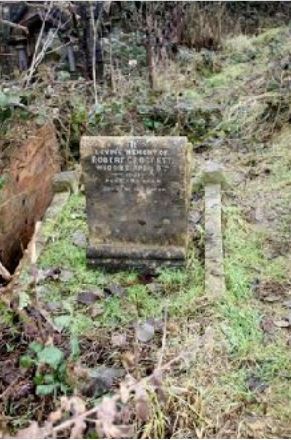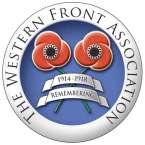Army General List

Robert Benjamin Crockett was born on 22 February 1873 in Stroud to Selina Crockett: father unknown.
The 1881 census records eight year old Robert, his mother and year-old brother Walter living with Selina’s brother, Alfred Hyett and his family at Mount Pleasant, Stroud. Alfred and Selina were cloth workers.
By the 1891 census Selina had married Edwin Barrradine and the growing family were living at Spillmans, Rodborough. Robert was now listed as being with the militia and Walter at school. Selina, who had married Edwin in 1884, had four more children.
On the occasion of the 1901 Census, which was conducted on 31 March, Robert was living at Horfield Barracks, Bristol.
Robert married Selina Long at Rodborough on 18 December 1907. They had two daughters, Irene Violet, who was born in Dholia, Gujarat, India on 1 July 1909 and Edna, who was born in Portsmouth on 12 June 1912. Neither of his daughters had children.
Robert enlisted at Bristol with the Gloucestershire Regiment on 23 November 1892. He signed up for seven years service with five in the reserve. His Army number was 3791. His service records for this period are extensive but alas I can find no record for his service during WW1.
His first overseas experience was in Malta where he served from November 1893 to October 1895. Cyprus followed then Egypt. Robert was then in India from February 1897 to September 1899 and again from November 1907 to November 1910. In between these two periods he served in South Africa.
Robert was promoted to Lance Corporal on 27 May 1893 and to Corporal on 7 March 1894. He became a Sergeant on 23 August 1902 and Colour Sergeant in January 1907. He was awarded the Good Conduct Medal with Gratuity following the South African campaign.
Robert was discharged from the Army, after 21 years service, at Bordon on 22 November 1913. He was then three months short of 40 years of age. His conduct with the colours was said to be ‘exemplary’ and it was stated that Robert was a ‘good accountant, thoroughly reliable, trustworthy and sober: would make an excellent person to be in charge of back premises’.
According to his obituary, Robert re-enlisted at the commencement of the Great War. He was stationed at Cheltenham, training recruits and afterwards saw service at Salonika. The Soldiers of Gloucestershire Museum lists him as being abroad on 20 September 1915. After his return to England he was promoted to the rank of Lieutenant Quarter-Master. His Medal Index Card states he was commissioned on 24 April 1917.
Robert died at Stroud on 8 April 1921.
My interest in Robert started when I volunteered to search for his grave, on behalf of the Cheltenham & Gloucester Branch WFA, and that of three others soldiers in Stroud Old Cemetery, whose location was unknown .
I located Robert’s grave in January 2010 in a very overgrown area of the site – it was being undermined by a badger sett, as was that of another soldier close by. Robert’s grave was not marked by a CWGC headstone. It was not until the following November that I decided to try and clear his grave – it would have been impossible to place a remembrance cross. I cleared all the brambles away and discovered a full sized grave. Touchingly, there was a spray of red silk roses in situ. I knew that his younger daughter, Edna, had died in 1995 and wondered if they had been there for fifteen years.
The area of Robert’s grave has now been cleared completely by cemetery staff. They are only allowed to do this every two years as the whole site is a nature reserve. The redundant badger sett has been filled in and the area made safe.
I decided to write to the two Stroud newspapers asking if there were any relatives and briefly outlined what I had found. On the evening of the day it was published I had a call from Lisa Lambert, whose father, John, was the nephew of Robert’s son-in-law, Jack Lavis. The family was unaware of the site of the grave. Lisa told me that her family had inherited an amount of memorabilia from Edna. It included Robert’s dress sword, his service revolver (which has been handed in), numerous photographs, newspaper cuttings and a sympathy letter to his widow from a fellow soldier, who was serving with the Army in Kanturk, Co Cork.
We met at the cemetery and Lisa brought with her all the photos, articles and his dress sword.
Lisa did not know the cause of Robert’s death but his obituary states that he died following ‘a long and painful illness, which he bore with courage and fortitude’. The subsequent acquisition of his death certificate indicated that death was due to cancer of the bladder.
At his funeral Robert was accorded full military honours, including the sounding of the Last Post.
In conclusion, Robert appears to have been highly respected both within the Army and by his friends and neighbours. Prior to the War he had been the licensee of the Post Office Inn, in George Street, Stroud.
W Brain wrote in his letter of sympathy: ‘I shall always have very pleasant memories of him, for he was one of the few who helped me through when I joined the 1st Bn. in Portsmouth and I know he was always pleased to see me at any time.’
Researched by Helen Wallington December 2010
Note: There are aspects of this story which are intriguing. For a grave to be recorded in the CWGC records, an individual must have died whilst serving with the armed services (or related organisation) or as a result of that service: the cut-off date for the record being 31 August 1921 (when Parliament officially declared the Great War to be over). Such records that do exist for Robert indicate that he left the Army on 3 February 1919 and was granted a pension (no indication as to reason) as from 1 April 1919. Perhaps he had a condition, brought about by his service, as distinct from the bladder cancer, which was stated to be the actual cause of death.
Graham Adams
